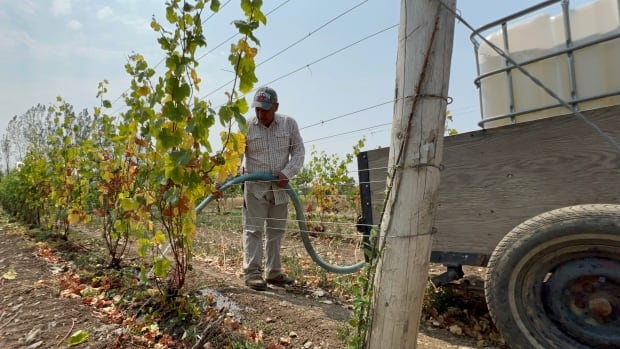Top Stories
Urgent: Drought Forces Winery Owner to Hand-Water 12,000 Vines

UPDATE: Tim Kuepfer, owner of Broken Stone Winery in Prince Edward County, Ontario, is facing an unprecedented crisis as he resorts to hand-watering his 12,000 vines during the driest summer in his 15 years of winemaking. With rainfall 70-90% less than normal, Kuepfer is making 60 trips in a week to haul water, a task he describes as “nearly impossible.”
The situation has reached a critical point, with Environment Canada confirming that the region is experiencing the largest rainfall deficit in southern Ontario. Drought conditions have left vineyards and crops suffering, and Kuepfer warns of an estimated 15-20% loss in production due to yellowing leaves and shriveled grapes.
“Honestly, I’m doubting my own sanity considering it,” Kuepfer stated. “I have to make sure that I do everything I can to prevent loss of the crop. It’s just the way it is.” The unrelenting sun continues to scorch the county, with drought conditions classified as either “abnormally dry” or “moderate drought” by Agriculture and Agri-Food Canada.
As the county endures this harsh weather, signs of distress are evident everywhere—scorched lawns, stunted crops, and trees shedding leaves in a desperate attempt to conserve moisture. “This year seemed like it was going to be the perfect year,” Kuepfer lamented, recalling how the crop initially flourished.
But Broken Stone Winery is not alone in its struggle. Don Williams, a seventh-generation farmer and vice-president with the Ontario Federation of Agriculture, describes this growing season as “depressing.” “We don’t control none of it,” he said, emphasizing the unpredictable nature of farming as they battle both wet springs and now extremely dry conditions threatening other crops like soybeans and corn.
With no rain in sight, Kuepfer’s daily cost for watering his vineyard has skyrocketed to about $1,000. He remains hopeful, recalling that in previous years, his efforts to water the vines often prompted timely rainfall. As he hand-waters each plant, he clings to the possibility of a sudden change in weather.
“Every time before, when I started watering the vineyard, it’s always rained almost immediately,” he noted. However, as the first two weeks of August approach, forecasts indicate that the dry spell may persist, leaving farmers and winemakers in a precarious position.
As the situation develops, Kuepfer’s determination to save his vineyard serves as a poignant reminder of the impact of climate on agriculture. The human toll of these extreme weather patterns weighs heavily on those who rely on the land for their livelihoods. With the stakes higher than ever, the community watches and waits for relief from the skies.
Kuepfer’s immediate next steps include continuing the labor-intensive process of hand-watering, as he prepares for what comes next—hoping for rain and the chance to salvage a season that started with such promise.
-

 Politics4 weeks ago
Politics4 weeks agoSecwepemc First Nation Seeks Aboriginal Title Over Kamloops Area
-

 World5 months ago
World5 months agoScientists Unearth Ancient Antarctic Ice to Unlock Climate Secrets
-

 Entertainment5 months ago
Entertainment5 months agoTrump and McCormick to Announce $70 Billion Energy Investments
-

 Science5 months ago
Science5 months agoFour Astronauts Return to Earth After International Space Station Mission
-

 Lifestyle5 months ago
Lifestyle5 months agoTransLink Launches Food Truck Program to Boost Revenue in Vancouver
-

 Technology3 months ago
Technology3 months agoApple Notes Enhances Functionality with Markdown Support in macOS 26
-

 Lifestyle3 months ago
Lifestyle3 months agoManitoba’s Burger Champion Shines Again Amid Dining Innovations
-

 Top Stories2 months ago
Top Stories2 months agoUrgent Update: Fatal Crash on Highway 99 Claims Life of Pitt Meadows Man
-

 Politics4 months ago
Politics4 months agoUkrainian Tennis Star Elina Svitolina Faces Death Threats Online
-

 Sports5 months ago
Sports5 months agoSearch Underway for Missing Hunter Amid Hokkaido Bear Emergency
-

 Politics5 months ago
Politics5 months agoCarney Engages First Nations Leaders at Development Law Summit
-

 Technology5 months ago
Technology5 months agoFrosthaven Launches Early Access on July 31, 2025





















